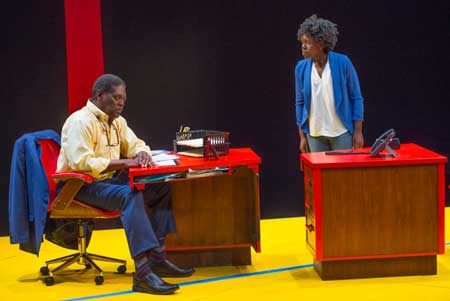Play (1992)
by David Mamet
Directed by Elaine Vaan Hogue
New Repertory Theater
Arsenal Center for the Arts
Watertown, MA
October 14 – November 5, 2017
With Johnny Lee Davenport (John), Obehi Janice (Carol)

Obehi Janice as Carol
in “Oleanna”
Photo: Andrew Brilliant / Brilliant Picture
Courtesy of New Repertory Theater
John (Johnny Lee Davenport) is a college professor, Carol (Obehi Janice) is his student who comes to see him about a problem. John is inadvertently dismissive, taken up with a phone call about a house purchase meant to follow his expected upcoming receiving of tenure. Carol is genuinely frustrated by her course with John and in the process of discussion becomes increasingly frustrated by his behavior. Over several meetings, the intensity of the interactions evolves and various tables get turned.
David Mamet wrote a draft of this play a year before President George H.W. Bush, in 1992, nominated Clarence Thomas to the Supreme Court and Anita Hill testified against him. A script about sexual harassment in academia which had, even to Mamet, seemed a bit far-fetched, now took on new importance and Mamet reworked it. Oleanna appeared shortly thereafter.
With noted Boston actors Johnny Lee Davenport as John and Obehi Janice as Carol in the two roles the play takes on a special significance in this regard. Both Davenport and Janice are African-American and the recollection of the Thomas-Hill controversy is even more vividly called to mind as a result. One remembers from the Hill testimony the various elements in Thomas’ behavior which seemed oddly off the mark and indicative of a suggestiveness that was inappropriate in a Supreme Court justice. Hill’s account stands to this day as a noble recounting of subtleties that one well imagined might easily magnify into far more problematic behaviors.
Mamet’s edgy, dour, difficult play explores exactly how that transformation from subtly inadvertent forms of dismissal or paternalism can transform, in the heat of interchange, into radically more severe conditions. Both Davenport and Janice give a good account of Mamet’s schematic of how that might occur, with Davenport beginning boldly and ending meekly while Janice begins meekly and ends boldly. The interactions are ultimately doomed and Mamet’s drama, if it has a general characterization, is a classic tragedy about the sometimes inevitable magnification of small injustices into large ones.
One might watch this drama and try to see it as a study of entrapment, or of academic hubris, or both. It is certainly a study of those themes, but ultimately its fundamental motif is a tragic fatalism masked by academic courtesy and decorum. In a way it is the opposite of Mamet’s two greatest tragedies American Buffalo and Glengarry Glen Ross which mask nothing. In those cases, brutalism breeds tragedy and the rawness of the brutality and the coarseness of the language generate humor.
In Oleanna there is virtually no humor. Whatever niceties there are masks a deep sense of revenge palpable throughout. If there is any irony it is in the relentlessness of fate. Oleanna is humorous in the way Oedipus Rex is – it’s laughably inevitable and so sad that one can only laugh at the possibility that things have gone so badly.
Though Mamet’s writing in Oleanna is quite at the level of American Buffalo and Glengarry Glen Ross, its capturing of a potently evolving tragic narrative is akin to those earlier masterpieces. There isn’t the same kind of edgy patter and there’s not enough rhythmic cursing to give it the sort of music those works have. It is, in some sense, a steelier and sleeker tragedy, its depiction of gradually amplified transgression as vividly timely now as it was
twenty-five years ago.
– BADMan
Leave a Reply